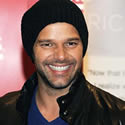Living
YEAR IN REVIEW: Best quips and quotes
From classic lines to mammoth blunders, gay topics kept tongues wagging

“I am proud to say that I am a fortunate homosexual man. I am very blessed to be who I am.”
— Pop singer Ricky Martin, in a coming out message on his website which cited his two sons as his inspiration to speak out (Rickymartinmusic.com, March 29)
“You know if I could go back in time, I would lez it up 24 hours. Believe me, one thing I would not miss? Balls. Terrible little things.”
Betty White in the “Gingey” skit, one of several with gay jokes that were part of her May 8 appearance as host of “Saturday Night Live.” (NBC.com, May 8)
“Tired Gay succumbs to Dix in 200 meters”
Headline on a July 3 Reuters article about Walter Dix beating Tyson Gay in the 200 meters at the Prefontaine Classic Diamond League track meet. (Reuters.com, July 3)
“Please spare me the 40-minute dissertation on how fabulous ‘Glee’ is. It’s 2010. You can just come right out and say you’re gay.”
Comedian Bill Maher in his “New Rules for Emmy,” a humorous take on the Aug. 29 television awards broadcast (HollywoodReporter.com, Aug. 26)
“When I sit here and I hear adulterers and womanizers and folks cheating on their wives and down-low brothers saying they are going to vote against this [civil unions] bill, it turns my stomach … We know what you do at night!”
Illinois State Sen. Rickey Hendon (D-Chicago) as the Illinois Senate debated a bill to offer civil unions to gay couples, which passed Dec. 1. The governor has pledged to sign it into law. (Queerty.com, Dec. 1)
“What I really meant was that the sound of the guitar is very happy.”
—Former Guns N’ Roses guitarist Slash, backtracking after initially saying the guitar hook on Michael Jackson’s “Black or White” was “gay.” (Spinner, March 15)
“I feel like the biggest weight is off my shoulders, Publicity stunt my ass, this is my life.”
Momentary lesbian Kim Zolciak on Twitter (TV Guide, March 24)
“I would not be surprised if Oprah is gay. If she is, she is. It certainly fits.”
Author Erica Jong, a friend of talk show maven Oprah Winfrey, as quoted in Kitty Kelley’s new book, “Oprah: A Biography.” (USA Today, April 11)
“There are half a million kids in foster care in America. To have public officials deem homosexuals unworthy of parenting is disastrous for the nation, for equality and for humanity and, Mike, for Christianity.”
Lesbian comedian and talk show host Rosie O’Donnell in an April 24 chat with former Arkansas Gov. Mike Huckabee on her Sirius radio show. Huckabee, who ran for president in 2008 and may run in 2012, criticized gay adoption last month by saying that “children are not puppies.” (New York Daily News, April 24)
“What I’m saying is that I think the ideal environment for children is in a relationship that has both a mother and a father.”
Mike Huckabee, attempting to explain his remarks to Rosie O’Donnell. (New York Daily News, April 24)
“I prayed every day for God to change me and it was, ‘Dear God, please don’t let me be gay. I promise to be a good person.’ … Young people in every corner of America are being told by their churches … that they are damaged goods and they are not. I have to stand up. I’m in a unique position.”
Chely Wright on why she decided to come out publicly (Toronto Sun, May 19)
“I promise you I did not kiss her and it is ridiculous that two entertainers can’t even rock out with each other without the media making it some type of story.”
Pop singer Miley Cyrus, 17, defending her recent performance on “Britain’s Got Talent,” in which the Daily Mail reported she simulated a kiss — but did not actually touch lips — with a female backup dancer. (Us Magazine, June 5)
“I think if two people love each other, then what the hell? I think that everyone should have the chance to be equally miserable, if they want.”
Rapper Eminem, who has previously been criticized for anti-gay lyrics, supporting gay marriage in an interview with the New York Times Magazine (The Guardian, June 18)
“Please don’t tell me that God made Adam and Eve, not Adam and Steve. If the Bible story is literally true, who did Cain marry?”
Cox newspapers columnist Cynthia Tucker, arguing that allowing same-sex couples to marry will not weaken heterosexual marriage (AJC.com, June 18)
“I think I’ve been in every gay club from New York to California. I would be in clubs with my recorders in my pocket, taping people talking. But at the end of the day, I drew more from my sisters and my mother. I’ve been mimicking them my whole life. They’re in my bones.”
Actor Nelsan Ellis, who is straight, on how he creates the character of Lafayette, the flamboyant gay Louisiana man he portrays on HBO’s vampire series “True Blood.” (Philadelphia Inquirer, July 4)
“Like maybe I’m having a clandestine affair with Ricky Martin. I know it’s really gonna upset a lot of gay men — I’m sure hundreds of ’em are gonna be jumping off the Golden Gate Bridge — but I ain’t available. I ain’t gay. Sorry.”
Sen. Lindsey Graham (R-S.C.) responding in a New York Times interview to long-standing rumors about his sexual orientation (WLTX.com, July 1)
“To boost development, a city needs to be open to a full range of people, especially the innovative ones who break barriers, like people of the gay community.”
Houston Mayor Annise Parker, the first openly gay mayor of a major U.S. city, in remarks at the Shanghai World Expo. Parker led a 60-member Houston business delegation to the Chinese city. (Xinhua, Aug. 2)
“You have a rare opportunity to right a wrong and I pray to God that you will take it. As an African American you understand the ugliness of hate and the pain of discrimination. This is not a battle of heterosexual against homosexual, but a struggle of justice against injustice.”
Black LGBT activist C.D. Kirven in an open letter to Alveda King, niece of Martin Luther King Jr., requesting a meeting to discuss King’s claim that gay marriage is “genocide” at a recent anti-gay marriage rally in Atlanta (Cherrygrrl.com, Aug. 9)
“I believe that Thomas Jefferson said: ‘If it neither breaks my leg nor picks my pocket what difference is it to me?’”
Conservative talk show host Glenn Beck, when asked on “The O’Reilly Factor” if he thinks gay marriage is “going to harm the country.” (Washingtonpost.com, Aug. 12)
“So, get this: David and I are expecting twins this fall. We’re super excited/nervous/thrilled.”
Actor Neil Patrick Harris, announcing via Twitter that he and his partner, David Burtka, will become parents via surrogacy. The babies were born in October. (USMagazine.com, Aug. 14)
“I always am confused why they don’t worry about shows that don’t have any gay characters on them. They should put some focus on them as well, but we’ll give the audience exactly what they need.”
Eric Stonestreet, who plays Cam on the ABC series “Modern Family,” on how his character will finally kiss partner Mitchell on the hit show – but allegedly not because of a Facebook campaign and other critics clamoring for a gay kiss (E! Online, Aug. 23)
“This church asks me to be in the closet about my sexual orientation and about my faith. I am a Christian lesbian pastor who marries heterosexual couples and lesbian and gay couples; I cannot lie about either part of me nor would I ask any pastor to do this.”
Rev. Jane Spahr, during testimony in her Presbyterian Church trial for marrying same-sex couples. Spahr was found guilty and censured. (New York Times, Aug. 28)
“And thank you to all the gays for remaking this video over and over again.”
Lady Gaga, accepting the Video Music Award for Best Female Video for her song “Bad Romance.” (MTV.com, Sept. 12)
“I think we should just try to make heterosexual divorce illegal.”
Iconic filmmaker John Waters on how gay and lesbian couples can achieve marriage equality. (Associated Press, Sept. 13)
“All women are lesbians except those that don’t know it yet.”
Lesbian feminist writer and cultural critic Jill Johnston, author of “Lesbian Nation,” during a 1971 debate over feminism. Johnston died Sept. 18 at age 81. (New York Times, Sept. 21)
“One of the reasons I was interested in exploring this character is we don’t often see a guy my age gay on television, explored in an intelligent, dignified, funny, serious way. So I thought, when David approached me with it three years ago and said, what if Saul’s gay? I said, bring it on.”
Actor Ron Rifkin on Uncle Saul, the older, newly out, HIV-positive man he plays on the ABC series “Brother and Sisters,” which premiered its new season last week. (Advocate.com, Sept. 23)
“I know what it’s like to be bullied and teased every single day, and I know that it may seem like there is no chance of happiness left. But I promise you there is a world full of acceptance and love just waiting for you to find it.”
Actor Chris Colfer, who plays Kurt Hummel on “Glee,” in a PSA for The Trevor Project, a national 24-hour, toll-free confidential hotline for gay and questioning youth. (TrevorProject.org)
“With a voice like this, you know I got to be a New Yorker. But I’m also an American. And to me that means justice and equality and liberty for everyone.”
Actress Fran Drescher in a video for a new Human Rights Campaign ad series that urging New Yorkers to support gay marriage. (On Top Magazine, Oct. 21)
“After a hurricane comes a rainbow.”
Lyric from “Firework,” the new Katy Perry song that includes two boys kissing in the music video. The New York Times noted the current string of gay-inclusive pop songs. (New York Times, Nov. 5)
“It will completely get rid of Gloria Gaynor’s ‘I Will Survive’ as the gay anthem.”
Sir Elton John on the title track to Lady GaGa’s new album, “Born this Way,” set to be released in early 2011. (Entertainment Weekly via the New York Times, Nov. 5)
“Death threats, and the now-worldwide controversy surrounding your election of me as bishop, have been a constant strain, not just on me, but on my beloved husband, Mark, who has faithfully stood with me every minute of the last seven years, and in some ways, you.”
U.S. Episcopal Bishop Gene Robinson, who became the Anglican Communion’s first openly gay bishop in 2003, announcing his retirement seven years early (The Guardian, Nov. 7)
“I don’t think any gay person is going to be happy and bring joy to themselves and other people unless they can be honest about their sexuality, and if other people don’t like that honestly, that’s a comment on them and not on the person who is being honest.”
Actor Sir Ian McKellen, who came out in 1988, expressing his fear that some managers and agents continue to pressure gay actors not to come out. (Popeater.com, Nov. 5)
“In terms of a leading man, a heterosexual, playing a homosexual … do you worry about your image as a leading man and a heterosexual?”
Talk show host David Letterman, stammering as he questioned actor Jim Carrey about his new film “I Love You, Phillip Morris,” in which Carrey plays a likable gay con artist. (ABC, Nov. 19)
“Boy, we haven’t grown at all, have we? We are still children in the schoolyard. For god’s sake, Dave, have you ever seen a gay man?”
Actor Jim Carrey, responding to David Letterman’s questions. (ABC, Nov. 19)
“I don’t want to underplay this, because I understand it is very significant. But I don’t want to overplay it either. I don’t want people to think I am anything other than an associate municipal court judge.”
Attorney Phyllis Frye, on her appointment to the Houston bench, making her the first openly transgender judge in Texas. (Houston Chronicle, Nov. 22)
“In the light of this broad and profound vision of human sexuality and the problems it currently faces, the Pope reaffirms that ‘the Church does not of course consider condoms to be the authentic and moral solution’ to the problem of AIDS.”
Statement from the Vatican after Pope Benedict said in an interview that condoms, which the Catholic Church bans, may be appropriate for HIV prevention in certain situations like male prostitutes. (NationalPost.com, Nov. 22)
“That means the next TSA official that gives you an enhanced pat-down could be a practicing homosexual secretly getting pleasure from your submission.”
Eugene Delgaudio, a member of the Loudoun County (Va.) Board of Supervisors and president of the conservative group Public Advocate of the United States, in an e-mail denouncing the TSA’s inclusive non-discrimination statement (WTOP, Nov. 30)
“It was like the pink elephant in the room that was never touched upon until it was the day to shoot. Then we just did it really quickly and called it a day.”
Actress Mila Kunis discussing her lesbian sex scene with Natalie Portman in the new movie “Black Swan”; Kunis says she asked her father not to watch the scene. (MTV.com, Nov. 30)

Dear Michael,
I keep getting rejected on the apps. I don’t want to put myself out there anymore.
I don’t understand gay men. I think they behave really badly.
Guys stop replying in the middle of a text conversation and then un-match me. Guys don’t show up when we make a plan to meet. After a date or even a hookup that it seems clear we both enjoyed, I never hear from the guy again.
I am a pretty good looking and successful guy. I’m not a model or a billionaire but I’m sincerely wanting to date and eventually share a life with someone.
Unfortunately, everyone I am meeting, even if they say they have similar aspirations for a partner, acts like they’re looking over my shoulder for something better, and drops me for I-don’t-know-what reason.
I don’t have a lot of trust in the sincerity of gay men.
I know I sound bitter but I’ve been at this for a while and it keeps happening.
I know there’s a saying that if it keeps happening to you, you must be the problem. Logically that makes sense.
Except, I think this keeps happening so often and so predictably that it’s not me. These people hardly know me. It’s more along the lines of, if everything about me isn’t exactly what they want, or some little thing that I say, think, or do offends them, they vanish.
I’m lonely, but what’s out there is awful. Maybe it’s best to not keep trying.
If you have a different way of seeing it that’s honest, not just some fluff to make me feel better and be hopeful, please enlighten me.
Michael replies:
I agree with you, there is a lot of this kind of behavior out there. I hear stories similar to yours all the time. Though people do find great relationships online, relying on apps to meet a partner can be tricky.
Hookup apps have little to do with any kind of real connection. Often, they don’t even have much to do with sex. For a lot of people, they’re more about trying to fill up some kind of emptiness and seeking validation. They also, obviously, objectify men, which is the opposite experience of what you’re seeking.
And dating apps lend themselves to a sort of takeout menu concept of dating. You get to specify exactly what you’re looking for—a little of this, a lot of that, please omit something else—and then believe you should get what you ordered. As if that really exists. And when something isn’t just what you wanted, forget it.
But life doesn’t work that way. Nor do people: You can enter the exact criteria for the man of your dreams, but he will surprise you or let you down at times in some major ways. That’s how it goes. Part of being in a relationship is accepting that we all have to deal with imperfection.
All that said, hordes of people are going to keep using all sorts of apps and keep looking for “perfect” partners and keep ditching perfectly fine guys for the most minuscule of reasons.
But that doesn’t mean that you have to stay on the apps if it’s demoralizing you and leaving you hopeless.
Before you sign off, perhaps you would like to have some fun and be creative. Just for example, you could write in your profile that you’re interested in meeting a guy who isn’t looking for perfection and is looking for a decent soul rather than a set of stats. You still might encounter a lot of guys who ghost you for no apparent reason, but you also might have some luck finding a sincere someone with relationship goals that are similar to yours.
Another, complimentary strategy: Toughen up your attitude to stop letting let these rejections get under your skin. They have little to do with who you are (unless you are oblivious to some major issue about yourself), so you needn’t take them personally. In other words, expect this to keep happening; and when it does, laugh and keep moving forward.
I understand you are feeling like giving up on gay men in general. Keep in mind that while there are a lot of reasons why many gay men focus more on sex and less on commitment, that isn’t true across the board. In my work over the years, I have met many gay men who are looking for what you’re seeking. You could strive to be hopeful that if you keep looking, you are likely to cross paths with some of them.
And where you look may play a role.
Whether or not you stay on the apps, I suggest you seek additional ways to meet a potential boyfriend. Before apps existed, people did find other ways to meet romantic partners, and these ways do still exist. I know that this path is not an easy one. The whole dating endeavor isn’t easy. But difficult is not impossible.
There are social and activity groups for gay men that are organized around some sort of shared interest. They aren’t overtly sexual, so often attract people who are interested in and looking for a deeper connection. Even if you don’t meet a boyfriend there, you might make some like-minded friends, and one thing may lead to another in all sorts of ways.
There’s also plenty you can do as a human being (not simply as a gay man) in the offline world that might interest and even uplift you, where you just might meet a man you like. Again, you might also simply make some friends, and through having a bigger social life, might ultimately meet your guy.
Simply put: Don’t let yourself feel like or be a victim. Don’t keep putting yourself in miserable situations. And figure out what it means for you to do your best to make what you’d like to happen, happen.
Michael Radkowsky, Psy.D. is a licensed psychologist who works with couples and individuals in D.C., Maryland, Virginia, and New York. He can be found at michaelradkowsky.com. All identifying information has been changed for reasons of confidentiality. Have a question? Send it to [email protected].
Real Estate
New year, new housing landscape for D.C. landlords
Several developments expected to influence how rental housing operates

As 2026 begins, Washington, D.C.’s rental housing landscape continues to evolve in ways that matter to small landlords, tenants, and the communities they serve. At the center of many of these conversations is the Small Multifamily & Rental Owners Association (SMOA), a D.C.–based organization that advocates for small property owners and the preservation of the city’s naturally occurring affordable housing.
At their December “DC Housing Policy Summit,” city officials, housing researchers, lenders, attorneys, and housing providers gathered to discuss the policies and proposals shaping the future of rental housing in the District. The topics ranged from recent legislative changes to emerging ballot initiatives and understanding how today’s policy decisions will affect housing stability tomorrow.
Why Housing Policy Matters in 2026
If you are a landlord or a tenant, several developments now underway in D.C., are expected to influence how rental housing operates in the years ahead.
One of the most significant developments is the Rebalancing Expectations for Neighbors, Tenants and Landlords (RENTAL) Act of 2025, a sweeping piece of legislation passed last fall and effective December 31, 2025, which updates a range of housing laws. This broad housing reform law will modernize housing regulations and address long-standing court backlogs, and in a practical manner, assist landlords with shortened notice and filing requirements for lawsuits. The Act introduces changes to eviction procedures, adjusts pre-filing notice timelines, and modifies certain tenant protections under previous legislation, the Tenant Opportunity to Purchase Act.
At the same time, the District has expanded its Rent Registry, to have a better overview of licensed rental units in the city with updated technology that tracks rental units subject to and exempt from rent control and other related housing information. Designed to improve transparency and enforcement, Rent Registry makes it easier for all parties to verify rent control status and compliance.
Looking ahead to the 2026 election cycle, a proposed ballot initiative for a two-year rent freeze is generating significant conversation. If it qualifies for the ballot and is approved by voters, the measure would pause rent increases across the District for two years. While still in the proposal phase, it reflects the broader focus on tenant affordability that continues to shape housing policy debates.
What This Means for Rental Owners
Taken together, these changes underscore how closely policy and day-to-day operations are connected for small landlords. Staying informed about notice requirements, registration obligations, and evolving regulations isn’t just a legal necessity. It’s a key part of maintaining stable, compliant rental properties.
With discussions underway about rent stabilization, voucher policies, and potential rent freezes, long-term revenue projections will be influenced by regulatory shifts just as much as market conditions alone. Financial and strategic planning becomes even more important to protect your interests.
Preparing for the Changes
As the owner of a property management company here in the District, I’ve spent much of the past year thinking about how these changes translate from legislation into real-world operations.
The first priority has been updating our eviction and compliance workflows to align with the RENTAL Act of 2025. That means revising how delinquent rent cases are handled, adjusting notice procedures, and helping owners understand how revised timelines and court processes may affect the cost, timing, and strategy behind enforcement decisions.
Just as important, we’re shifting toward earlier, more proactive communication around compliance and regulatory risk. Rather than reacting after policies take effect, we’re working to flag potential exposure in advance, so owners can make informed decisions before small issues become costly problems.
A Bigger Picture for 2026
Housing policy in Washington, D.C., has always reflected the city’s values from protecting tenants to preserving affordability in rapidly changing neighborhoods. As those policies continue to evolve, the challenge will be finding the right balance between stability for renters and sustainability for the small property owners who provide much of the city’s housing.
The conversations happening now at policy summits, in Council chambers, and across neighborhood communities will shape how rental housing is regulated. For landlords, tenants, and legislators alike, 2026 represents an opportunity to engage thoughtfully, to ask hard questions, and to create a future where compliance, fairness, and long-term stability go hand-in-hand.
Real Estate
Unconventional homes becoming more popular
HGTV show shines spotlight on alternatives to cookie cutter

While stuck in the house surrounded by snow and ice, I developed a new guilty pleasure: watching “Ugliest House in America” on HGTV. For several hours a day, I looked at other people’s unfortunate houses. Some were victims of multiple additions, some took on the worst décor of the ‘70s, and one was even built in the shape of a boat.
In today’s world, the idea of what a house should look like has shifted dramatically. Gone are the days of cookie-cutter suburban homes with white picket fences. Instead, a new wave of architects, designers, and homeowners are pushing the boundaries of traditional housing to create unconventional and innovative spaces that challenge our perceptions of what a home can be.
One of the most popular forms of alternative housing is the tiny house. These pint-sized dwellings are typically fewer than 500 square feet and often are set on trailers to allow for mobility. Vans and buses can also be reconfigured as tiny homes for the vagabonds among us.
These small wonders offer an affordable and sustainable living option for those wishing to downsize and minimize their environmental footprint. With clever storage solutions, multipurpose furniture, and innovative design features, tiny homes have become a creative and functional housing solution for many, although my dogs draw the line at climbing Jacob’s Ladder-type steps.
Another unusual type of housing gaining popularity is the shipping container home. Made from repurposed shipping containers, these homes offer a cost-effective and environmentally friendly way to create modern and sleek living spaces. With their industrial aesthetic and modular design, shipping container homes are a versatile option for those contemplating building a unique and often multi-level home.
For those looking to connect with nature, treehouses are a whimsical and eccentric housing option. Nestled high up in the trees, these homes offer a sense of seclusion and tranquility that is hard to find in traditional housing. With their distinctive architecture and stunning views, treehouses can be a magical retreat for those seeking a closer connection to the natural world.
For a truly off-the-grid living experience, consider an Earthship home. These self-sustaining homes use recycled construction materials and rely on renewable energy sources like solar power and rainwater harvesting. With their passive solar design and natural ventilation systems, Earthship homes are a model of environmentally friendly living.
For those with a taste for the bizarre, consider a converted silo home. These cylindrical structures provide an atypical canvas for architects and designers to create modern and minimalist living spaces. With curved walls and soaring ceilings, silo homes offer a one-of-a-kind living experience that is sure to leave an impression.
Barn homes have gained popularity in recent years. These dwellings take the rustic charm of a traditional barn and transform it into a modern and stylish living space. With their open, flexible floor plans, lofty ceilings, and exposed wooden beams, barn homes offer a blend of traditional and contemporary design elements that create a warm and inviting atmosphere, while being tailored to the needs and preferences of the homeowner.
In addition to their unique character, barn homes also offer a sense of history and charm that is hard to find in traditional housing. Many of them have a rich and storied past, with some dating back decades or even centuries.
If you relish life on the high seas (or at a marina on the bay), consider a floating home. These aquatic abodes differ from houseboats in that they remain on the dock rather than traverse the waterways. While most popular on the West Coast (remember “Sleepless in Seattle”?), you sometimes see them in Florida, with a few rentals available in Baltimore’s Inner Harbor and infrequent sales at our own D.C. Wharf. Along with the sense of community found in marinas, floating homes offer a peaceful retreat from the hustle and bustle of city life.
From tiny homes on wheels to treehouses in the sky or homes that float, these distinctive dwellings offer a fresh perspective on how we live and modify traditional thoughts on what a house should be. Sadly, most of these homes rely on appropriate zoning for building and placement, which can limit their use in urban or suburban areas.
Nonetheless, whether you’re looking for a sustainable and eco-friendly living option or a whimsical retreat, there is sure to be an unconventional housing option that speaks to your sense of adventure and creativity. So, why settle for a run-of-the-mill ranch or a typical townhouse when you can live in a unique and intriguing space that reflects your personality and lifestyle?
Valerie M. Blake is a licensed Associate Broker in D.C., Maryland, and Virginia with RLAH @properties. Call or text her at 202-246-8602, email her at [email protected] or follow her on Facebook at TheRealst8ofAffairs.
-

 Virginia3 days ago
Virginia3 days agoMcPike wins special election for Va. House of Delegates
-

 New York5 days ago
New York5 days agoPride flag removed from Stonewall Monument as Trump targets LGBTQ landmarks
-

 Florida5 days ago
Florida5 days agoDisney’s Gay Days ‘has not been canceled’ despite political challenges
-

 Philippines5 days ago
Philippines5 days agoPhilippines Supreme Court rules same-sex couples can co-own property





















